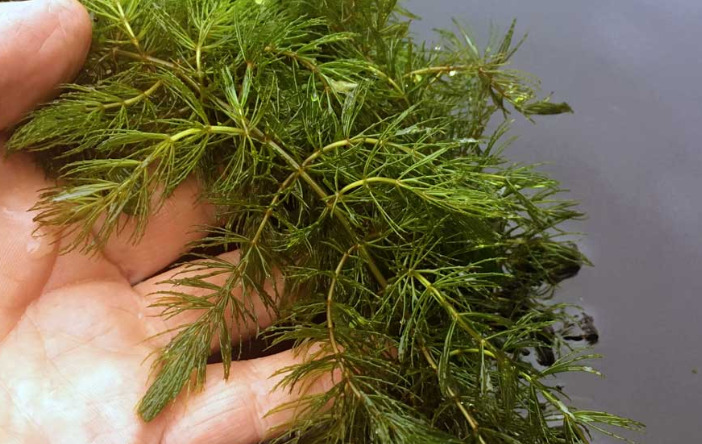
Sometimes, unwanted pond weeds can take over and spoil the serene setting of a pond. These pond weeds, if left unchecked, can grow rapidly, and cause various issues for the pond’s ecosystem. Let’s look at five types of troublesome pond weeds to control:
- Bushy Pondweed (Southern Naiad)
Bushy pondweed is a plant that naturally belongs to your pond. It anchors itself at the bottom and stretches up to the water’s surface. This plant has skinny leaves with tiny teeth along the edges. The leaves grow opposite each other on thin, lightly branched stems. Bushy pondweed multiplies by seeds and breaks apart into smaller pieces. It likes hard water, and you can spot it thriving in ponds that are ten feet deep or even deeper.
- Chara
Chara, also called Skunkweed or Muskgrass, is a type of gray-green alga that might be mistaken for underwater plants with roots. You can easily recognize it by its grainy or crunchy texture, which comes from calcium deposits on its surface. Chara has long, tube-like branches that are arranged in circles around each node, and if you happen to break it, you’ll notice a musky smell, which is why it got the nickname Skunkweed.
- Duckweed
Duckweed is a tiny, green plant that floats freely on the water’s surface. A problem arises when ducks can’t eat enough of it to keep it in check. Then, Duckweed can grow uncontrollably and become a nuisance. If it covers the whole surface of the water, it can cause a drop in the amount of dissolved oxygen, which is harmful to fish and may even lead to fish dying.
- Filamentous Algae
Filamentous algae are a type of algae that you might see clinging to plants, sticks, leaves, rocks, or mud in your pond. It looks like wet wool, hair, cotton, or slimy mats. Usually, it’s green, but sometimes it can turn yellowish, grayish, or brownish. This alga is a natural part of most water surfaces, and as it grows, it reaches up to the water’s surface and often breaks into smaller pieces. The wind and waves can then carry these pieces to other parts of the pond, spreading the algae around.
- Coontail
Coontail is a type of grass that looks bushy, with stiff leaves that form in circles along many branches. This plant is beneficial because it provides food and a home for fish and waterfowl all year round. However, if it grows too much, it can become a problem. It might get in the way of fishing, and when there’s too much Coontail, it can reduce the oxygen in the water, which isn’t good for the pond’s health.
Learn More About Pond Weeds Control Products and Tips
Knowing which pond weeds to look out for is the first step in keeping your pond looking healthy and clean. For more information or tips on pond weed control, ask an expert today.